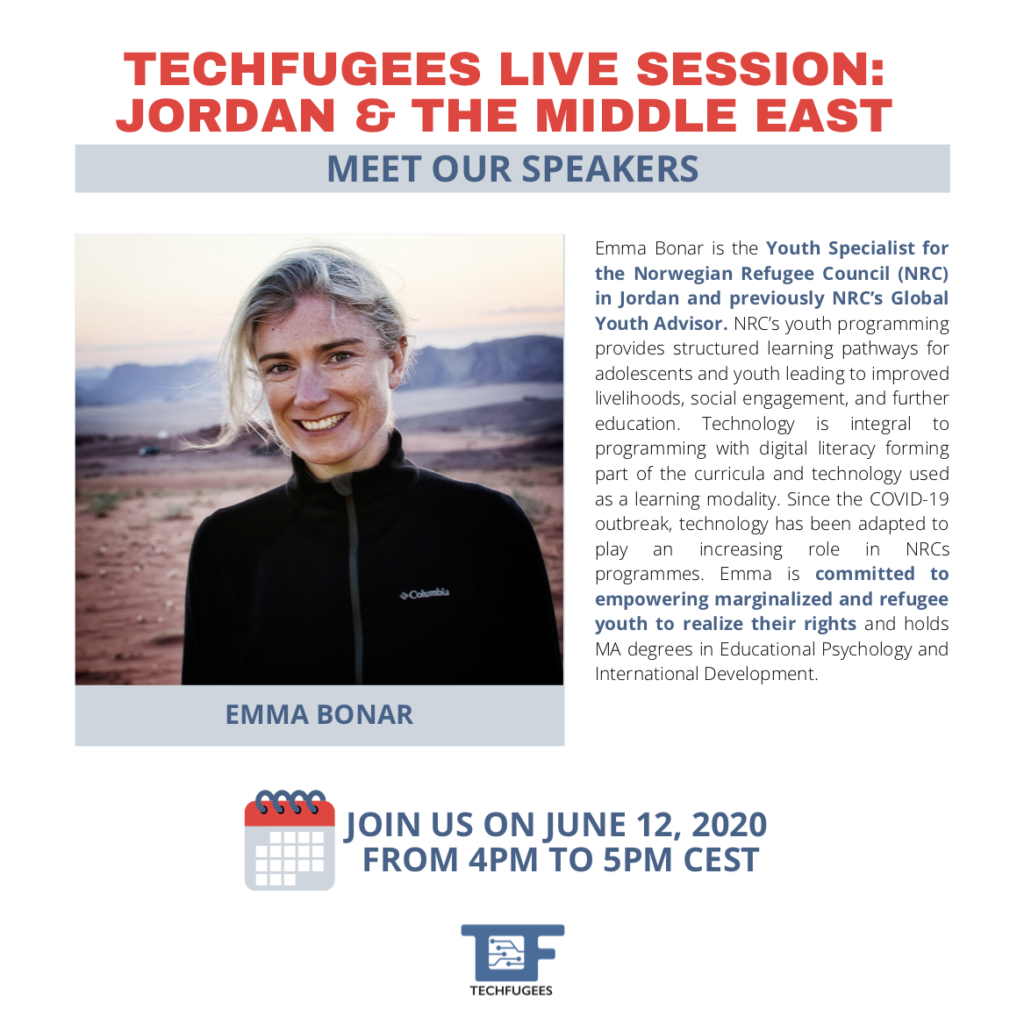In March 2020, Techfugees community launched its very own Data Hub to map the impact of Covid_19 among displaced communities. As well as to suggest tech-based solutions that help mitigate the crisis. By the end of May, TF Data Hub inaugurated the Live Sessions. You missed the first ones? Read it here: https://techfugees.com/all_news/coronavirus-has-not-crumbled-resilience-discover-how-through-techfugees-live-sessions/
The Middle East & Jordan: the power of youth!
Last June 12th, Techfugees held it’s third live session, focusing on the Middle East & Jordan. The region is particularly affected by several conflicts that cause displacement of people, bringing together 21 million refugees, as Matthew Gardiner explained while introducing the talk.

Emma Bonar, Youth Specialist for the Norwegian Refugee Council (NRC) in Jordan, took the floor to give context about the specific situation in the country, where she believes there is an “amazing opportunity” for young people to be positive contributors. The speaker’s introduction paved the way for the main topic of the session: the youth, predominant among refugees in Jordan.
Young people are four times more likely to be unemployed than adults in developing countries. The NRC’s response is to work in five main areas: Shelter,; Livelihood,; Legal assistance,; Youth; and Education services
Next, Ahmad Bassam explained the complexity of the situation in Jordan, where 56 nationalities of refugees, who have such different needs, coexist. Can you imagine? Besides, almost 30% of the residents in the country are refugees! But they all have something in common: the side of youth. The session mediator then presented Dina Ala’eddin, from the Youth Task Force in the Za’atari refugee camp, an action-oriented field-level forum established in 2014 to focus on youth-specific advocacy, planning and coordination. To ensure the needs of young refugees are met, several organizations work together in the camp, providing services like spaces for networking and support, innovation hubs, vocational training, social initiatives, and employability skills.
Another important point made during the session is how young refugees, who should keep studying as any other children and teenagers, are adapting to the coronavirus pandemic. Tariq Al-Hariri, an online facilitator in the Za’atari refugee camp, explained that students were divided into smaller groups in order to follow online classes. Learning is also fueled by discussion groups on WhatsApp.
Lastly, Saddam Sayyaleh, social entrepreneur and director of programs in Majlisna and I Learn Jordan, joined the discussion to talk about all of the solutions created to integrate refugees with innovation, helping them build skills and educate themselves. He highlighted how organizations who work closely with displaced persons can help them follow a more prosperous path and what is the role of technology. “My Education in Your Hands”, for example, was a campaign made in April to support Government efforts in allowing equal access to e-learning.
The session continued with Q&A and interesting debates raised by the audience.. Watch our recording of the event to know more: https://www.youtube.com/watch?v=CuBcv-J0p40
Europe & Greece: The end of an era?
Two weeks later, on the 24th of June, we held our fourth Techfugees Live Sessions, which dived into another region of the world where the future of displaced communities is far from certain – the Greek hotspot refugee camps.

There are over 50,000 refugees in Greece, 22% of those are experiencing undetermined lockdown in five different islands: Lesbos, Chios, Kos, Samos, and Leros. Camille Martel outlined how the “hotspot approach” was proposed by EU agencies to Member States as a way to cope with growing migratory pressure in 2015. They were formalized through the EU-Turkey Agreement of March 2016 as the EU’s official “reception and identification centres”.
While the hotspots were proposed as a pilot model for a more permanent registration and identification system across Europe, they have proven to be inadequate and in conflict with the EU asylum and immigration acquis/laws. Newly arrived migrants have been trapped in prolonged and undetermined detention, leading to overcrowded camps, unlawful repatriation, and overall infringement of fundamental human rights, essentially consolidating the challenges and shortcomings already inherent in the Dublin system.
With a surge of arrivals in 2019, pre-existing issues of overcrowded camps and deficient infrastructure only got worth, making these hotspots an ideal environment for the spread of COVID-19.
Mathias Mertens, co-founder of Europe Must Act, explained how Turkey’s borders opening in early March this year acted as a tipping point, resulting in a wave of violence against refugees across the Greek islands, as well as against NGO workers. Europe Must Act was born in a climate of uninterrupted violence inside the Greek hotspot camps. Centres were set on fire and the right to asylum was suspended.. Despite three local outbreaks of COVID-19 in camps the call of a cohort of 60+ NGOs (read their Open Letter here) for the decongestion and interruption of the unjustified lockdowns of the hotspots refugee camps have not been answered by the Greek authorities so far.
As we have seen across these Live Sessions, the pandemic has heavily impacted organizations’ usual humanitarian activities within displaced communities. Jumana Abo Oxa, a psychologist and humanitarian focusing on protection and trauma issues in crisis situations for Elpida Home, brought another facet/vision of the current hotspot camp crisis in Greece to the session – the need for protection and mental health support for survivors of gender-based violence,torture and general violence in the camps. Much of Jumana’s work has had to reinvent itself through the use of technology in order to replace the human interactions that mental health support requires, but currently posing a threat to the – mental – health of refugees.
Humanitarians are not the only ones whose job has been affected and reinvented due to the pandemic. Mortaza Behboudi, a journalist working for Arte TV, explained some of the detrimental effects of this limbo, looking specifically at his coverage of the Moria Camp in Lesbos. Mortaza emphasized how the lockdown prolongation for the fourth time has heavily limited his access to the camp and therefore to information of the current situation of the camp’s inhabitants. The lockdown’s prolongation is the result of the stigmatization of refugees and migrants as possible carriers of COVID-19. As a second wave of the virus is highly expected, and as the EU continues to fail in providing concrete solutions to the hotspot camp burden, we could only ask ourselves whether this situation would eventually bring the end of hotspot camps.
Did this brief overview of the session intrigue you? Then watch our recording of the event here: https://www.youtube.com/watch?v=95m-LFF6Mj4
To learn more about Techfugees Data Hub & to join the incredible team behind the scene, click here: bit.ly/covidrefugees






